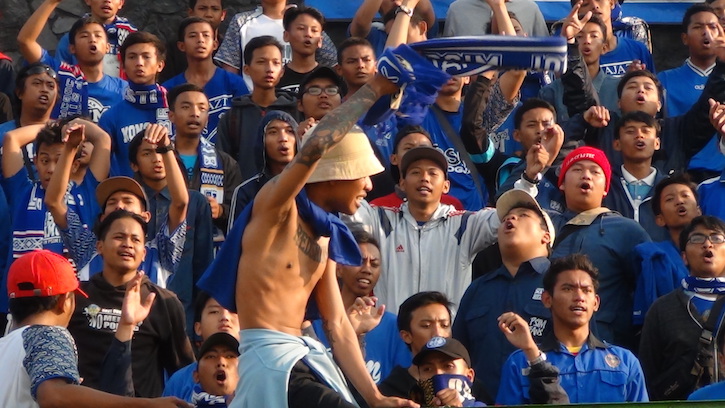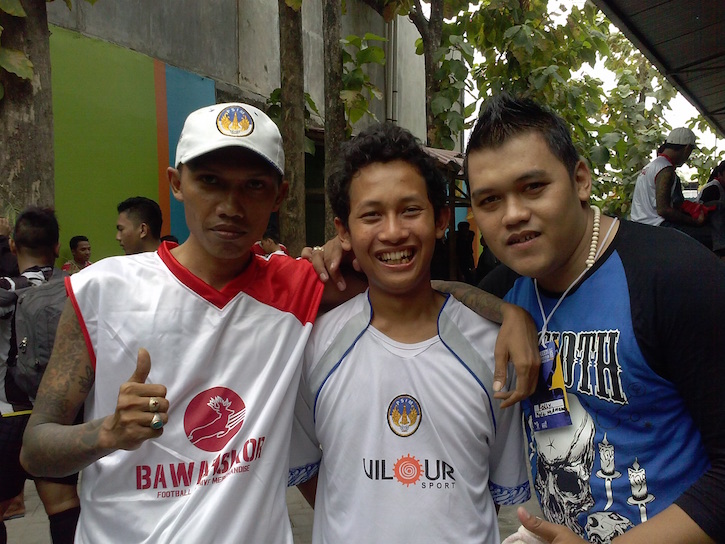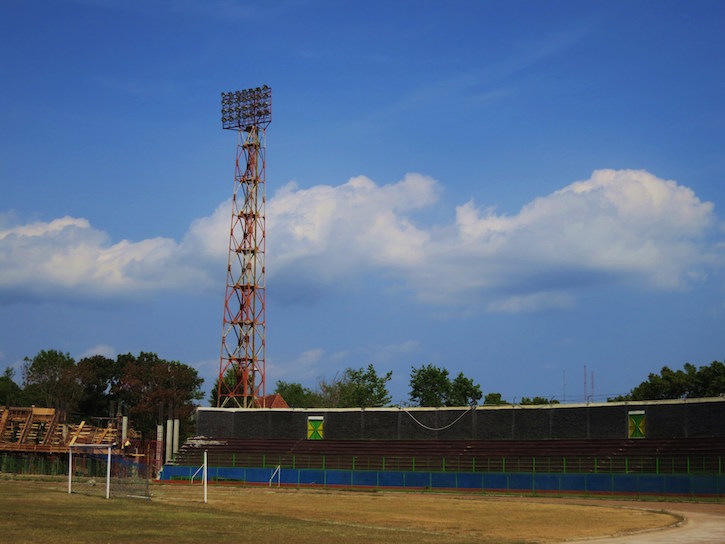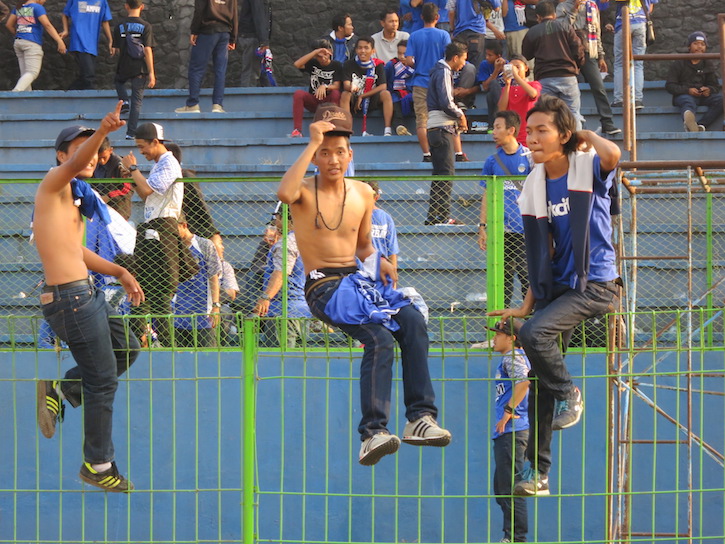Yogyakarta’s notorious Brajamusti elects a president
Andy Fuller
Football is the most popular spectator sport in Indonesia with second division games regularly attracting crowds of 30,000 spectators. Massive dance choreography and chanting are usually performed for the full duration of games, creating enormous spectacles. Yet, the passionate and creative fan culture also has an ugly side: intense rivalries between supporter groups often lead to stone-throwing battles and even killings on the streets of cities such as Yogyakarta and Solo.
One group regularly involved in these kinds of battles is the Brajamusti (‘Brayat Jogja Mataram Utama Sejati’) who actively support Yogyakarta’s oldest team, PSIM (Persatuan Sepak Bola Indonesia Mataram). The name Brajamusti relates to a weapon of Gatotkaca from the Mahabharata, implying that the group is a kind of weapon for PSIM. Indeed, Brajamusti supporters are known to be violent, uncontrollable and provocative. They have ongoing clashes with the Pasoepati from Solo and with other supporters from Yogyakarta.
Nevertheless, the Brajamusti are more than just a bunch of football hooligans. Some of its members maintain close links to political and religious organisations as well as the local art scene in Yogyakarta, while at the top of the organisational hierarchy, there is intense competition for leadership positions.

Founded in February 2003 with the aim of uniting a broad array of smaller fan groups (laskars), the Brajamusti now boast a membership of up to 10,000. Although members are overwhelmingly male and young, a few girls, known as Brajamolek, also align themselves with the group. Many PSIM supporters who participate in Brajamusti activities like to emphasise the informality and looseness of their affiliation, but loyalties towards the original laskars remain strong. These factional loyalties also play an important role when it comes to electing the Brajamusti president, an event that takes place every two years.
A change in direction?
The most recent of these presidential elections was held in February 2015. Only the laskars that have been formally recognised by the Brajamusti hierarchy could participate in the poll. Generally, a minimum of 50 members is needed to form a laskar and all recognised laskars needed to be registered several months before the election to be able to cast a vote for one of the presidential candidates.
The 2015 election pitched a well-connected local tough-guy, Rolly, against the outgoing president’s chosen successor, Mamex. In the lead up to the poll, the intense rivalry between the candidates, frequent threats of violence and open animosity between the different groups within the Brajamusti shaped the campaign. At the same time, it exposed the complex linkages between football and other social microcosms in Indonesia.
Rolly’s campaign, for example, was strongly supported by two activists from the local art scene, Dimaz Maulana, the founder of Bawah Skor and OBA, an alternative football and arts space in Yogyakarta, and Adnan D Kusuma of punk band DOM 65. Both men are ardent PSIM supporters and Adnan, in particular, has lots of street-cred within Yogyakarta’s football community. As the renowned front-man of a punk band, he is respected for his wildness, drinking and toughness. Adnan grew up and still lives in the neighbourhood of the Mandala Krida Stadium, the home of PSIM. He is the respected leader of the West Mandala Drinking Club laskar but he also feels a strong connection to the Brajamusti, which he describes as a kind of gang, a brotherhood.
As one of its elders, Adnan can shape the culture and politics of the Brajamusti. Throughout the presidential campaign, he used his skills as a musician and vocalist to strengthen the cultural output of the Brajamusti supporter group, for example by developing new chants for the upcoming season. Adnan’s involvement became a crucial part of Rolly’s campaign as both men felt that the Brajamusti supporter group had become stagnant and sluggish at PSIM matches.
A curious trio
During the campaign, Rolly and Adnan were often joined by Dimaz. Much younger than Adnan, Dimaz is currently establishing a reputation for himself as a diligent and creative PSIM activist and football activist in general. He produced the jerseys for PSIM’s pre-season games and sells PSIM-related merchandise from OBA. He has had a residency at Lear alternative arts space in northern Yogyakarta while working a day job at Cemeti Art House south of the city. Dimaz regularly speaks at discussions on maintaining team-focused websites and creating archives. The opportunity to collaborate directly with a potential Brajamusti president no doubt presented Dimaz with the chance to reach a new audience and degree of influence amongst PSIM supporters.

The involvement of Dimaz and Adnan gave the impression that Rolly was seeking to re-brand the Brajamusti as a more creative, artistic and somewhat educated supporter group. Even Rolly himself often defied his well-known reputation for violence, appearing polite and well-groomed throughout much of the campaign. Together with Adnan and Dimaz, he would visit the laskars on the outskirts of Yogya to get input from other members as to how the club could be better run. Indeed, Rolly’s commitment to PSIM is beyond doubt and his service to both the club and the Brajamusti has gone beyond the usual acts of passive fandom. Working in an unofficial capacity, he would find jobs for players, take part in their negotiations for employment, and would sanction their departure from the team. Rolly was not an outsider to PSIM, but a part of the many different layers of its everyday management. He is known to the players and respected by many of the younger Brajamusti supporters.
At the same time, Rolly is widely feared. A regular participant in clashes with rival supporter groups, he was once accused of killing a member of one of the Brajamusti’s main rivals, The Maident. He denied this allegation, but his tough-guy reputation was nonetheless considered to be one of the selling points for his candidacy as many Brajamusti were believed to favour leaders who are archetypal macho males. According to Rolly, there was an agreement amongst football fans that violence is a part of the culture of supporting a team.
Rolly’s other asset in the campaign was his organisational experience in religious organisation Gerakan Pemuda Kabah and Partai Persatuan Pembangunan, a conservative Islamic party. Both of these organisations are known in Yogyakarta for their active roles in oft-violent anti-Ahmadiyah protests during the past decade. Rolly openly admitted that he had mobilised his masses to rally against Ahmadiyah followers and boasted that he was successful in disbanding their worship. His disdain for the Brajamusti’s main rival, The Maident, also transcends from sport to religion and politics; The Maident are aligned with the secular nationalist party PDIP.
Remaining loyal
Rolly’s campaign was ambitious but ultimately unsuccessful. When the ‘musta’ (musyawarah anggota) was held at the Balai Kota in Yogyakarta, Mamex clearly won the election 80 votes to 40, with one laskar abstaining. The endorsement from the previous president, Eko Satrio Pringgodani, proved too powerful for the aspirations of Rolly and co. Pak Eko always kept his distance from Rolly, Adnan and Dimaz and aligned his activities closely with those of Mamex. Upon handing over his presidency, Pak Eko stated proudly that ‘this was a victory for all Brajamusti’.

The event took place peacefully and was attended by numerous local politicians including the mayor of Yogyakarta, Haryadi Suyuti, who implored the local civil servants present at the venue to attend more PSIM home games. Soon after the election, Mamex sought to end hostilities with The Maident, and the Brajamusti turned their attention to the preparations for the PSIM’s upcoming 86th anniversary.
Dimaz’s close affiliation with Rolly, the losing candidate, did not have a negative effect on his production of paraphernalia. Through his clothing label, Bawah Skor, he has been able to appeal to broad cross section of PSIM fans, regardless of affiliation to Rolly or Mamex or Brajamusti, and The Maident in general. Adnan’s notoriety with DOM 65 ensures he has not lost face in the wake of the election defeat. Rolly, too, despite his defeat, maintains an active role, mobilising support amongst fellow PSIM-activists, biding time for another tilt at the leadership.
Andy Fuller (@readingsideways) researches sports and urban cultures and is currently based in Leiden, The Netherlands. His website is readingsideways.net.












